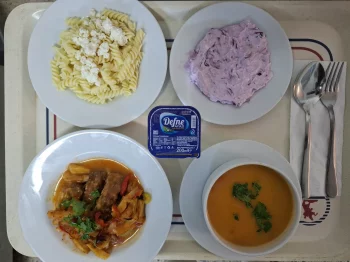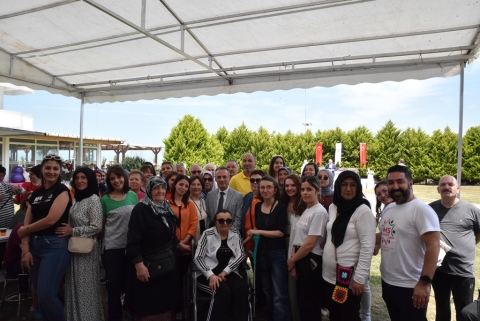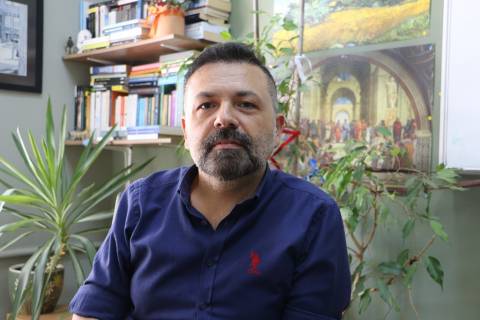OMU symposium explores addiction risks and prevention strategies for children and youth
Raising awareness with the theme “Addiction in the world of children and youth: Risks and protective approaches”
The second edition of the Children’s Symposium, organized by the Department of Social Work at Ondokuz Mayıs University (OMU) Faculty of Health Sciences, was held at the Blue Hall of the OMU Atatürk Congress and Culture Center. This year’s theme was “Addiction in the world of children and youth: Risks and protective approaches.”
The symposium addressed risk factors related to addiction among children and adolescents, preventive and protective approaches, and examples of good practices from a scientific and interdisciplinary perspective. Various forms of addiction, psychological impacts, social work practices, and treatment processes were discussed.
“Addiction is a multidimensional social problem”
In his opening speech, Assoc. Prof. Dr. Mahmut Yaran, Vice Dean of the Faculty of Health Sciences, emphasized that the symposium aimed to raise awareness about child protection and addiction prevention:
“Addiction is a multidimensional social problem that involves not only the individual but also the family, environment, and society. The field of social work carries an important responsibility in this regard through both preventive and supportive efforts. Furthermore, our Ethics and Social Work Community’s project titled ‘Digital Empathy in Social Work’ has been selected for support by the Ministry of Youth and Sports. I sincerely thank our faculty members who contributed to this valuable symposium and hope it will help raise new awareness for promoting healthy child development and combating addiction.”
“Alongside substance addiction, technology and social media addiction are also rising”
Prof. Dr. Ercümend Ersanlı, Head of the Department of Social Work, stated:
“We are here not only for an academic meeting but to develop ideas that can touch the lives of children and youth and ensure a safer and healthier future for them. Childhood and adolescence are the most fragile yet most hopeful stages of life. Today, addiction does not only refer to substance use — behavioral addictions such as technology, gaming, and social media have also become widespread. Children sometimes turn to screens to escape loneliness, or to substances to suppress pain. Therefore, addiction is not merely a clinical issue but a child protection matter based on rights. Preventing addiction requires ensuring that children have access to a safe family environment, supportive schools, and accessible health and social services. Establishing an inclusive social support system, family structures that say ‘you are not alone,’ and schools that stand by children is a shared responsibility for us all.”
“These symposiums strengthen inter-institutional dialogue”
Hazal Cenik Delen, Acting Provincial Director of Family and Social Services and Social Worker, highlighted the importance of collaboration:
“Addiction threatens not only individuals but also families, society, and future generations. As the Provincial Directorate, we conduct preventive work through psychosocial support, education, and awareness activities, and we strive to prevent secondary victimization among children who are at risk of addiction or delinquency. Through Child Rights Committees, we also encourage children to form positive social environments and develop an awareness of advocacy. I believe that holistic approaches and social awareness are vital in combating addiction, and events like this symposium strengthen inter-institutional dialogue.”
Following the opening speeches, Research Assistant Mustafa Çağatay Erol from OMU State Conservatory’s Department of Music gave a musical performance.
Opening Panel: “Addiction among children and youth: Overview and social dimensions of childhood addiction”
Moderated by Prof. Dr. Fazıl Arabacı from the Faculty of Health Sciences, Department of Social Work, the opening panel emphasized that addiction is not merely an individual issue:
“Addiction is, in essence, the surrender of one’s will, family, and future. Our society needs young people who can think freely, dream, and carry our nation forward with stability. As the late Nurettin Topçu said, ‘To think is to exist.’ Therefore, both as individuals and as a society, we need young minds who think critically, question, and produce. Throughout this symposium, experts will address addiction-related challenges faced by youth within a scientific framework.”
Participating online, Prof. Dr. Kültegin Ögel delivered a presentation on the relationship between addiction and brain development, psychosocial development, social learning cycles, the progression of risky behaviors in adolescence, the onset of substance use and treatment, and the specific challenges and needs of adolescents struggling with addiction.
Expert presentations across three thematic panels
Panel 1: “Types of addiction and psychopathology”
This panel examined various forms of addiction and their psychopathological aspects. Moderated by Prof. Dr. Gökçe Nur Say (Department of Child and Adolescent Psychiatry, OMU Faculty of Medicine), presentations included:
• Assoc. Prof. Dr. Neriman Aras: “The psychopathology of addiction”
• Dr. Emre Ürer: “Types of addiction in children and adolescents and related psychopathologies”
Panel 2: “Treatment and preventive approaches in addiction”
The second panel focused on treatment methods, protective factors, and social work interventions. Moderated by Prof. Dr. Ömer Böke, Head of the Department of Psychiatry at OMU Faculty of Medicine, the panel featured:
• Assoc. Prof. Dr. Selçuk Özdin: “Treatment approaches in addiction”
• Assoc. Prof. Dr. Nurullah Çalış: “Factors leading to addiction and protective factors”
• Social Worker Özge Korkut Bayram: “Addiction in children: Clinical processes and social work practices”
Panel 3: “Interdisciplinary collaboration in addiction treatment”
The third panel explored interdisciplinary collaboration models and field experiences in addiction treatment. Moderated by Prof. Dr. Gülsüm Çamur (Department of Social Work, OMU Faculty of Health Sciences), the panel included:
• Psychiatric Nurse Müzeyyen Deveci: “ÇEMATEM operations and nursing approaches”
• Psychologist Elif Eren: “YEDAM psychotherapy practices in addiction treatment”
• Social Worker Betül Turan Esen: “YEDAM social work practices”
At the end of the panel sessions, participants emphasized the importance of strengthening preventive policies and education-based approaches in combating addiction. The symposium underlined the significance of child welfare, family support, and social solidarity, and called for stronger institutional cooperation to achieve lasting solutions.
Attendees included Assoc. Prof. Dr. Mahmut Yaran, Hazal Cenik Delen, Sibel Kılıç (Branch Manager, Samsun Provincial Directorate of Family and Social Services), Fikriye Sekmen (President, Association of Social Workers Samsun Branch), staff from the Family Support Center under the Samsun Governorship, professionals from Atakum Municipality, social workers from various public institutions, and faculty, staff, and students from OMU Faculty of Health Sciences.
The Children’s Symposium 2025, which drew considerable attention, concluded with a question-and-answer session, the presentation of certificates of appreciation, and a commemorative group photo.














